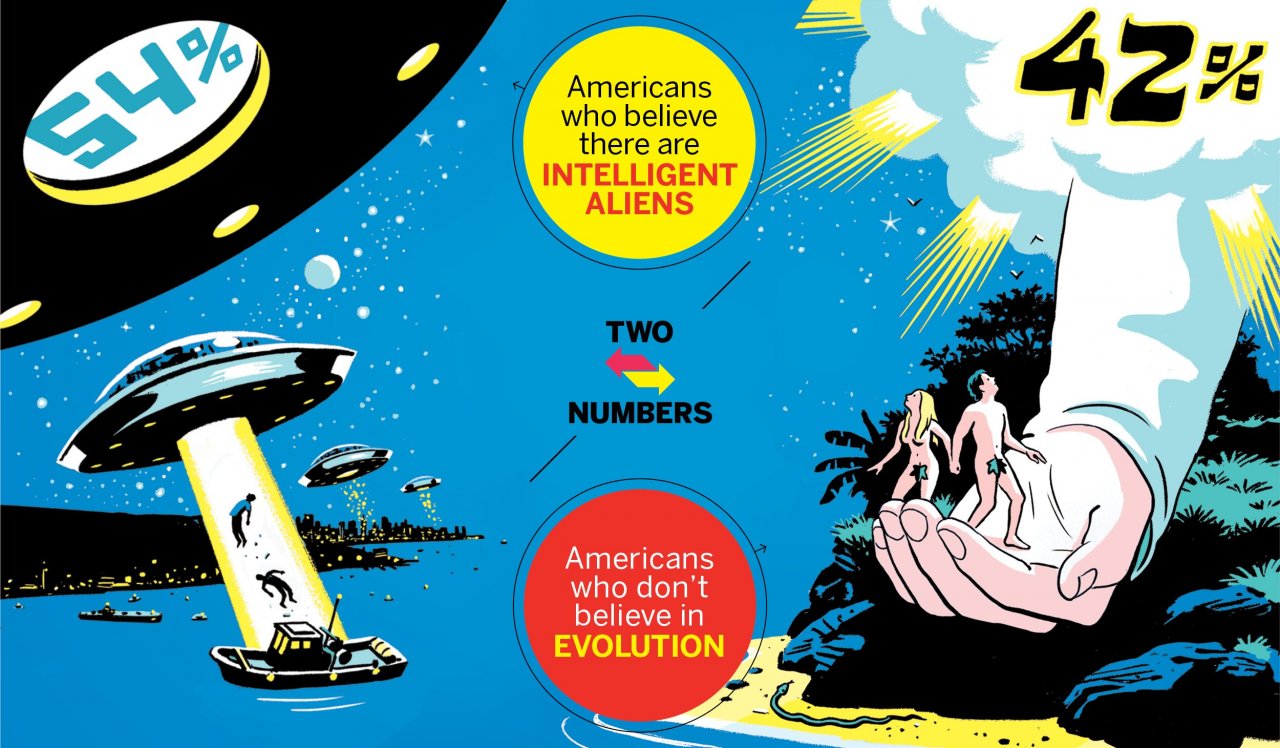Are we alone in the universe? Slightly more than half of Americans, 54 percent, don't think so. They believe in the existence of intelligent aliens, according to a poll conducted in mid-September by the market research and survey company YouGov.
Meanwhile, 22 percent said they don't know if there are intelligent extraterrestrials, while only 24 percent think that such beings do not exist. On the other hand, many of those who don't believe in aliens certainly don't think we are "alone" in the cosmic sense; nearly two-thirds of these people explain their views by responding that "humans were created by a god or another higher being." (Most of the remaining alien nonbelievers—31 percent—chose the response that "the Earth is unique—it is the only place capable of sustaining intelligent life.")
At the same time, 42 percent of Americans think "God created humans in their present form 10,000 years ago," according to a 2014 Gallup poll. Just under one-third think humans have evolved, but with God guiding the process. Finally, 19 percent subscribe to a godless view of human evolution. Both the Gallup and YouGov polls surveyed 1,000 or more people, and have a margin of error of plus or minus 4 percentage points.
There certainly seems to be some overlap between religiosity and belief in aliens. Women tend to be more religious than men, polls and studies have repeatedly found, and only 46 percent of them assert the existence of extraterrestrials, compared with 62 percent of men. People over 65 are also more likely to be religious and harbor a creationist viewpoint (50 percent) and are slightly less likely than those younger than them to believe in aliens (at 48 percent). Political background—which tends to align with religiosity—also seems to play a part. More than half of Republicans, who are more likely to profess to being religious, say they don't believe in aliens or don't know if they exist. On the other hand, nearly two-thirds of Democrats think that extraterrestrial intelligence is real.
It may perhaps come as a surprise, then, that the biggest opponents of government funding for the search for extraterrestrial intelligence have been Democrats. Senator William Proxmire ridiculed the idea of looking for aliens when it was proposed by NASA in the early 1980s. Senator Richard Bryan of Nevada (a lifelong Episcopalian), also a Democrat, finally killed the NASA investment in SETI work in the early 1990s, telling Cosmos magazine that "the Great Martian Chase may finally come to an end. Millions have been spent and we have yet to bag a single little green fellow. Not a single Martian has said 'take me to your leader.'" At the time, the amount funneled toward SETI work was only $10 million annually, a tiny portion of NASA's $14 billion or so budget.
Since then the SETI Institute has broken off from NASA; it is now run independently and in serious need of further funding to continue its pursuit of ET. It has gotten by with investments from Silicon Valley investors like Paul G. Allen, William Hewlett, David Packard and Nathan Myhrvold—many of whom are openly apolitical or nonreligious. Ultimately, of course, when it comes to finding aliens, the limiting factor isn't religiosity or politics per se, but cold hard cash—and the time we need to explore the universe.
















